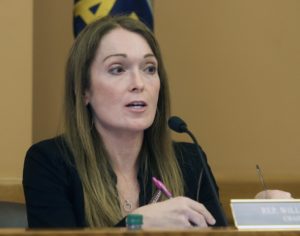
IT's time to activate! "This is nothing short of an effort to deal a death-blow to Kansas public schools." -Mark Farr, Kansas NEA President
Instead of working to support educators on the frontline of a global pandemic that has wreaked havoc upon the entire world, hyper-partisan conservative legislators led by Kristey Williams in the Kansas House and Ty Masterson in the Senate are using the crisis as cover to launch the most mean-spirited, anti-public education attacks Kansas has seen since the Brownback era.
“This is nothing short of an effort to deal a death-blow to Kansas public schools. If we were to imagine a more tone-deaf, deceptive effort to ram through legislation that will send us cartwheeling back to segregation-era inequality, even the decade lost to Sam Brownback’s disastrous policies wouldn’t compare to what will happen to neighborhood schools under these policies. Attacking the rights of teachers, using false promises as bait to garner support, and doing it all under the cloak of a global pandemic while most Kansans are trying to stay safe and working is shameful for any elected official. Sadly, these legislators are counting on the fact that Kansans are looking the other way. For the those lucky enough to have the time to be watching carefully, what they’ll get to see is the special-interest spin-machine churning out glowing talking-points and headlines that mask the reality of a singular and determined effort to gut public schools and make Kansas a state of haves and have-nots. Our members will not stand for it, and I’m calling on every member to dig deep, plug-in and get loud, because the people spearheading this effort are convinced that the pandemic will keep you silent and disengaged. And they’re counting on the fact that by the time we notice that our schools are figuratively on fire, it will be too late to do anything to save them.”
Weekend homework for every KNEA Member
1. Read the details in this posting of Under the Dome (scroll down) and familiarize yourself with the issues and attacks that are happening right now.
2. Pull talking points from the article and from the “Comparing Pandemic Playbooks for Public Schools” located at the bottom of this page. This graphic provides strong general talking points contrasting the unified effort professional educators are taking and the attacks coming from the legislature.
3. Most Important: CALL first, then email your House and Senate Representatives. You can find them and contact information by CLICKING HERE. Be their teacher, raise your voice, tell your story. They need to hear from you and why this effort to dismantle public schools and attack teacher rights is WRONG. Even if you don’t believe your rep will change their mind, they need to hear from you.
A Spoonful of Sugar? Thanks Mary Poppins.
We probably all remember that valuable advice we got from Mary Poppins in the Disney film. If something is too nasty to swallow, just add a spoonful of sugar. “Just a spoonful of sugar helps the medicine go down.”
 Well, that’s the basic premise behind the House K-12 Budget Committee’s school finance bill. It’s loaded up with nasty but sprinkled with just a spoonful of sugar in the hopes that we can all choke it down.
Well, that’s the basic premise behind the House K-12 Budget Committee’s school finance bill. It’s loaded up with nasty but sprinkled with just a spoonful of sugar in the hopes that we can all choke it down.
First, you’re going to have to choke down two massive programs designed to send high achieving or athletically gifted low-income students to private schools at government expense. The Committee started with HB 2119 (a full-blown voucher program) and added HB 2068 (a radical expansion of the current voucher program) to create a mega voucher bill for the benefit of private schools that will not be required to meet accreditation standards or report any student achievement data.
The provisions of HB 2119 still in this new bill (House Substitute for HB 2119) give vouchers to “eligible students” and it defines “eligible student” as one that (italics is the language from the bill):
Is enrolled in any school of a school district and
qualifies for free or reduced-price meals under the national school lunch act; or
has been identified by such student’s resident school district as eligible to receive at-risk educational program services because such student: TRANSLATION: If you pass our admissions test or show through report cards that you are high achieving or if you hold a position on the school district’s varsity football/basketball/soccer/volleyball team, our door is open (at least until the end of the season anyway)!
is or has been determined to be performing below grade level in either English language arts or mathematics TRANSLATION: Sorry, you don’t meet our admissions standards.
has a high rate of absenteeism TRANSLATION: You’re a better fit for public schools.; or
has been identified as eligible to receive at-risk educational program services for any other reason specified by the school district TRANSLATION: We’re sorry we don’t offer programs for you.
HB 2068 which has been added to House Sub for HB 2119 expands the current tax credit voucher bill by changing eligible student from free lunch students in one of the 100 lowest-performing elementary schools to a free or reduced lunch student in any public school, K-12. The pool of voucher students is vastly expanded and gives private schools more leeway to deny admission to low-performing or at-risk students and focus recruitment efforts on high-achieving or athletically talented low-income students from even the best public schools.
So if you can choke down the voucher programs, you can now try to swallow this – state funding for vital school programs is replaced with temporary funds from COVID relief. This is a classic “supplant” move in which state funding is supplanted with temporary federal aid put in place to deal with a disaster or an economic collapse. The Legislature did this a number of years ago as we struggled to climb out of the Great Recession. The natural result of this is to dig a hole in the education budget, fill it with temporary money, and then find the state faced with the big hole later when the temporary aid ends.
For example, one program is the mental health pilot project. While the federal funds can be used to deal with mental health issues, it is restricted to issues directly related to the pandemic. Since the program was in existence prior to the pandemic, it is obvious that it is/has been dealing with issues that are not directly related to the pandemic. There is likely a question as to how much of the program could be funding by these dollars.
Now we’ll get some clawback provisions down your throat. Under this portion of the bill, if a district were to go to remote learning due to an emergency – let’s say COVID variants take off and cause another massive wave of infection and death – and if the district stays remote for more than 240 hours, then funding for that school district would be reduced to the virtual school funding level of $5000/FTE with no weightings. This provision essentially mandates that schools stay open for in-person instruction no matter what happens or face a massive reduction in funding.
“Good golly,” you’re probably saying. “This medicine is likely to kill the patient!” And you’d be right. And you’re probably wondering how any reasonable legislator could vote for this.
Well, that’s why, following Mary Poppins’ advice, the committee added a little bit of sugar.
First, they extended the sunset on high-density at-risk which was set to be phased out after this year. Of course, they eliminated state funding for high-density at-risk weighting, supplanting it with COVID relief funds.
Then they renewed the state-wide 20 mill property tax levy for schools. This vital funding source must be renewed every two years.
And finally, for one last sprinkle of sweetness, they want teachers to think they are appreciated by the Legislature. They put language in the bill recommending that school districts use their COVID relief funds to give every classroom teacher a check for $500. Not a raise (they tried to say it is), a one-time check. And they provide no money to pay for this check. And they don’t require that you get a check. It’s just a suggestion to school boards and gives those who support this bill a way to take credit publicly for getting dollars to teachers even though it is unlikely any teacher will receive anything except the responsibility to deal with the fallout from the insidious core policies in this bill.
Please don’t be fooled into thinking that the members who voted for this amendment and this bill appreciate the work you are doing. They have spent the first half of this legislative session trashing your work – asserting that no children in Kansas are learning and that teachers are the ones keeping schools closed. They refuse to acknowledge even for a minute that educators are spending more time with fewer resources trying to engage students in new and innovative ways. This is probably why the chair of the committee introduced legislation that would prohibit teachers from choosing who will represent them in bargaining/negotiations (HB 2411).
Now is the time to tell your legislators to reject this attack on public education regardless of the little sprinkles of sugar. The rest of the House needs to tell Speaker Ryckman and Chair Williams to stop the games, stop the attacks, fund our schools and give educators and students the time and tools they need to move forward from this terrible crisis and keep our public education system strong.
Attacking Teacher Rights- “If we didn’t pay teachers so much and give them such generous benefits, we wouldn’t have to put so much money into schools.”
Of course, to do this, they have to get rid of those pesky unions that keep saying teachers should be paid respectable wages, have good benefits, and safe working conditions.
That’s why we have HB 2354 and HB 2411.
House Bill 2354 is an almost annual effort by anti-government groups (Kansas Policy Institute, Americans for Prosperity, and the Kansas Chamber of Commerce) that would interfere with an individual’s right to join a public-sector union and use payroll deduction to pay their dues. It would stop the annual automatic renewal of payroll deduction requiring all union members to submit a new payroll deduction request every year. It would also require employers to tell anyone who submitted a form that they don’t have to join a union and then demand a follow-up from each individual confirming that they actually did want to join the union.

Kristey Williams, R-Augusta, is using the cover of a global pandemic to lead the attack on public education and teacher rights. Phone: 785-296-3971 Email: kristey.williams@house.ks.gov, Phone: 316 775-1440 Email: kristeywilliams@yahoo.com
This bill is really all about harassing would-be union members in an effort to keep them from joining a union. It applies to all public employees – state, municipal, and school district. And it’s interesting that the opponents to the bill along with KNEA and Working Kansas Alliance included firefighters and police officers as well as United School Administrators, the Kansas Association of School Boards, the City of Wichita, and the Kansas League of Municipalities. The proponents do not represent public employees and don’t even deal with public employee unions. But then, in a hearing on this bill several years ago, Eric Stafford of the Kansas Chamber of Commerce was asked repeatedly what interest the chamber – which represents private-sector employers – had in a bill hurting public sector unions, he finally lost his cool and shot back, “I need this bill to get rid of public-sector unions!” Everyone kept their cool in this year’s hearing!
But then we have HB 2411 which would prohibit teachers from selecting their own bargaining agent. You read that right. HB 2411 would have school boards choose the bargaining agent for the teachers. Under this bill, even if 100% of the teachers in a district affiliated with the same organization for representation, the school board could choose someone else to represent the teachers. We wonder if the ultra-conservatives backing this union-busting effort would be comfortable with a law that would require that the leader of the opposition party is responsible for choosing who speaks for those conservatives in all political matters like re-election campaigns or committee hearings, and floor speeches? Replacing the voice of educators in negotiations with a voice chosen by the school board is nothing more than a slap-in-the-face to teachers who dare to speak up for their rights.
Now let’s be fair, here. After 50 years of working together, we don’t think many school boards would interfere in the selection of the teachers’ representative. Labor relations in Kansas school districts are pretty good so why would a school board throw that relationship out? Yes, we have our conflicts now and again, but they are all ultimately resolved. So what reason could the legislature have in writing a bill with the potential to destroy those relationships? Because some legislators need this bill to get rid of public teachers’ unions.
Getting rid of teachers’ unions serves one purpose. Without teachers’ unions and collective bargaining, teacher salaries, benefits, and working conditions would undoubtedly be diminished. And if teachers are paid less if their benefits are limited or ended, and if we don’t have to worry about working conditions or hours of employment, schools would be cheaper to run and the wealthy Kansans and corporations represented by the Kansas Chamber of Commerce, Americans for Prosperity, and the Kansas Policy Institute could get new and bigger tax cuts.
There has been a hearing on HB 2354 and the bill may be voted on in House Commerce Committee soon. HB 2411 has not yet had a hearing.
You want to raise your voice, but you’re not sure what to say? Be a teacher. As you read through the report above, how did it make you feel? How will it impact your students and your community? Now call your representatives, leave a message if you have to, and tell them how you feel about these efforts to attack public schools. Use the talking points just below to have a conversation with your representative. Be respectful and expect the same in return. The absolute WORST thing you can do, is to do nothing at all.


